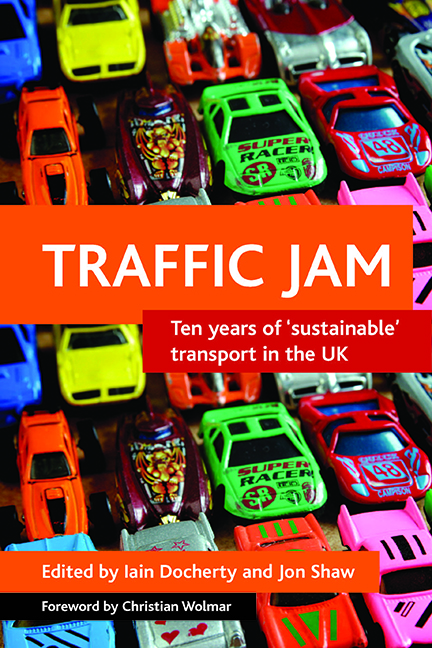Book contents
- Frontmatter
- Dedication
- Contents
- List of tables, figures and boxes
- Foreword
- Preface and acknowledgements
- List of acronyms
- Notes on contributors
- Part One Policy and politics
- Part Two Progress in policy implementation
- Part Three Ten years since A new deal for transport – signposts to the UK’s transport future?
- Index
seven - UK air travel: taking off for growth?
Published online by Cambridge University Press: 21 January 2022
- Frontmatter
- Dedication
- Contents
- List of tables, figures and boxes
- Foreword
- Preface and acknowledgements
- List of acronyms
- Notes on contributors
- Part One Policy and politics
- Part Two Progress in policy implementation
- Part Three Ten years since A new deal for transport – signposts to the UK’s transport future?
- Index
Summary
The publication of the White Paper A new deal for transport (DETR, 1998) presaged a period of intensive study into the UK air transport industry that, by way of the interim consultation paper on air transport policy, The future of aviation (DETR, 2000), culminated in the 2003 White Paper, The future of air transport (DfT, 2003). The last of these itself generated a further raft of studies in advance of the Air transport White Paper progress report (DfT, 2006). These key documents and their supporting papers are characterised by several recurring themes. First, the issue of airport capacity, and particularly its shortage in south east England, has dominated government thinking. Second, there remains an uneasy and unresolved conflict between controlling the environmental costs of civil aviation, the fastest growing source of carbon emissions, and fostering its contribution to the UK national and regional economies. Meanwhile, the entire supply side of the air transport industry has been revolutionised by: the growth of low-cost carriers (LCCs); their impact on the business structures of ‘legacy’ carriers; the privatisation and commercialisation of the bigger airports into ‘cathedrals’ of consumerism; and, not least, the security controls that have also transformed them into a traveller's dystopia.
This chapter addresses this policy debate and at least some of its myriad contradictions. (The focus is entirely on passenger air transport, space precluding an adequate consideration of air freight.) Following a brief introductory contextual discussion that summarises the strategies advanced in the milestone policy documents, the content is divided into three principal sections. First, I examine trends in UK air travel since 1998, focusing on the issues of airport capacity and the step-changes brought about by the LCCs. Second, the chapter turns to the more recent and current policy context introduced by the 2003 White Paper. This is concerned essentially with a tripartite interweaving of national and regional responses, mediated through the wider context of European Union (EU) policy. While UK air transport policy remains a matter reserved for central government, devolved regional administrations can influence airport policy and air transport provision through the planning process and strategies for regional economic development. Both national and regional policies have to be compliant, however, with the legislation that created and maintains the EU Single Aviation Market fully implemented in 1997.
- Type
- Chapter
- Information
- Traffic JamTen Years of 'Sustainable' Transport in the UK, pp. 139 - 160Publisher: Bristol University PressPrint publication year: 2008



